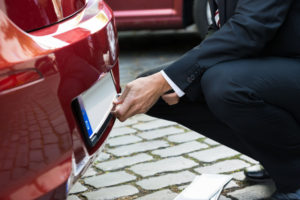
A number of new laws went into effect on August 1, and one that flew under the radar was in regards special registration license plates. These plates, oftentimes affectionately called “Whiskey Plates,” are reserved for someone who needs to apply for the special plates after a DWI conviction.
We’ve talked about whiskey plates in depth on the blog in the past, but they are one option for individuals who want to maintain their license following a certain type of DWI. If your plates are impounded following a DWI conviction, you may have the option to apply for these special registration plates in order to maintain your driving privileges, but you still may need to follow other restrictions in order to be eligible (like an ignition interlock device).
Update To Whiskey Plate Law
Under the previous law, if a person was required to apply for whiskey plates following a DWI conviction, that person needed to apply for whiskey plates for every automobile they solely or jointly owned. That meant that if a family had two or three vehicles for different family members to use, all of those vehicles would need to get whiskey plates due to the actions of one person. Nobody wants to drive around with a proverbial scarlet letter on their vehicle, especially if they did nothing to earn it.
As of August 1, Minnesota has tweaked the license plate requirement for those convicted of a DWI that warrants special registration plates. Now, the individual need only apply for whiskey plates for the vehicle that was being driven at the time of the infraction. Not only does this address a major inconvenience to other family members, but it also saves you from wasting more money buying whiskey plates for vehicles you never intend to drive. If you will be driving these vehicles, you do need to apply for whiskey plates, but if you’re just going to drive one vehicle, then you only need one set of special registration plates.
So what type of DWI convictions could lead to the need for specialist registration plates? In Minnesota, you may need to consider special registration plates if you:
- Have multiple DWI convictions within a 10-year period
- Have your license disqualified as a result of a DWI
- Have a DWI conviction with a BAC over 0.16 (twice the legal limit)
- Have a child under the age of 16 in the vehicle at the time of the arrest
If you want to avoid special registration plates, or you just want to earn the most favorable outcome for your case, reach out to Avery and the team at Appelman Law Firm today at (952) 224-2277.





